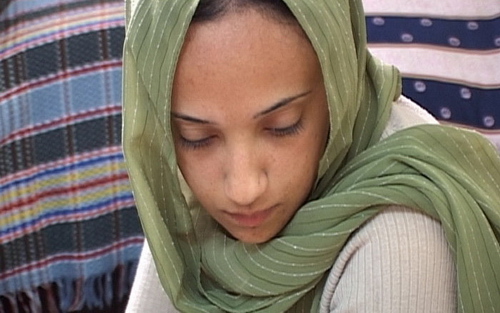Badal
A film by Ibtisam Salh Mara'ana

'A Badal deal marriage' usually means when a brother and sister from one family marry a sister and brother from another family - interlocking the two couples for ever.
Divorce on the part of one couple will immediately lead to the divorce of the other part of the deal. This is common practice in Muslim families in the Middle East.
The film follows a family during the process of putting such a deal together. It portrays the lives of Palestinian women living within Israel: their difficulties and struggle to be a part of their traditional society vs. the quest to maintain their full rights as women, and citizens of a Jewish state.
Um Waji, Ibtisam's aunt, 67 years old, married off her 10 sons and daughters in Badal deals.
Most of the film is shot in the courtyard where Um Waji lives surrounded by her sons and their families. And they all obey her wishes.
Now Um Waji is looking for a Badal arrangement for her eldest son Waji, a widower, and his 21-year-old daughter Miada, an unusual arrangement.
Ibtisam follow her aunt as she goes about arranging it, asking her son and granddaughter how they feel about it and observing what goes on in her courtyard.
Through the story of the girls in Um Waji's courtyard, the film examines the cycle of oppression exercised by women against women.
About the director:
Ibtisam was born in 1975 in Faradis, a Muslim, Arab, working class village in the north of Israel. At the age of 18 Ibtisam was accepted to film school where she began to create without previously ever having seen a film in a cinema.
Her first commercial release, Paradise Lost, is considered to be the first film to be made from the perspective of a Palestinian woman.
Her films explore gender, class, racism, collective and individual identity, history, the present and dreams for the future. They are a platform for bold and brave filmmaking which confronts taboos, examines and deconstructs structures of oppression.
The more society, both Israeli-Jewish and Palestinian, oppose Ibtisam's honesty and ideals, the deeper her work goes with an increasing network of supporters and creative-collaborators both locally and internationally.
Reviews:
Awards:
· HOT DOCS 2006, Best mid-length documentary.
· "Sole e Luna" Doc Fest, First prize 2006.
· Winner of Spirit of Freedom Award for Best Project
· IDFA 2005, Silver wolf competition.
· Montpellier Film Festival, 2006.
· International women film festival, Israel 2006.
· International Human Rights film festival, Nazareth 2006.
· Tempo Documentary Festival 2006.
· "Middle East: What Can Cinema Do?" Paris 2007.
· Roma Film Festival, 2007
Libraries:
Pan-American (Texas)
Brandon (Canada)
Arizona State Library
Auckland University Library (New-Zealand)
Jewish Video Library Seattle
Harvard Judiaca Libbrary
McGill University (Canada)
About the Film
56 Min, Arabic with English subtitles
Director: Ibtisam Salh Mara'ana
Producers: Osnat Trabelsi for Trabelsi Productions
Screenwriter: Ibtisam Salh Mara'ana
Editor: Rivka Yogev, Sara Slomon
Cinematographers: Ibtisam Mara'ana, Daniel Miran , Avigail Sperber
Original Score: Uri Ofir
Documentary – Islam, Israel, Minorities, Women, Middle East, Multicultural Studies
Links
Screenings
To arrange for a public screening, contact Nahum Laufer below.
Contact
For more information please contact Nahum Laufer.
Email: laufern@netvision.net.il
Fax: 972-3-5291726
Mail: Shlomo Hamelech 93 #5, Tel-Aviv 6451228
$350 DVD and streaming rights with 3 year license from institution's own internal server.
$100 Streaming rights for institutions with 3 year license from institution's own internal server that already purchased the DVD with Public Screening rights.
$175 Streaming rights for institutions with 3 year license from institution's own internal server that already purchased the DVD with only Library use.
